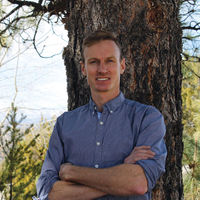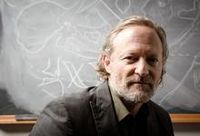Population Environment Short Course Faculty
From Santa Fe Institute Events Wiki
Population and the Environment Working Group and Short Course
This Working Group / Short Course is generously supported by the James S. McDonnell Foundation, and will be offered free of tuition for accepted students.
Working Group
October 13 - 14, 2018
Santa Fe Institute
1399 Hyde Park Road
Santa Fe, NM 87501
The working group is by invitation only.
Short Course
October 15 - 16, 2018
Santa Fe Institute
1399 Hyde Park Road
Santa Fe, NM 87501
The short course is by applying only.
Program Directors

Sir Partha Dasgupta, University of Cambridge
Professor Dasgupta's research interests have covered welfare and development economics, the economics of technological change, population, environmental and resource economics, the theory of games, the economics of under-nutrition, and the economics of social capital.

Paul Hooper, Director of Education, Santa Fe Institute
Dr. Hooper's research asks, to what extent can major patterns of variation in societal organization across human history be explained by a finite set of evolutionary principles and processes? Dr. Hooper's research combines ethnographic fieldwork in Amazonia and Central Asia with cross-cultural analysis and mathematical modeling. His work examines the biological and economic processes underlying the formation of human social networks, demographic rates of growth, fertility, ad mortality, as well as the emergence of social inequality, political hierarchy, and leadership.
Faculty

Caroline Bledsoe, Anthropology, Northwestern University
Caroline Bledsoe is the Melville J. Herskovits Professor of African Studies in the Department of Anthropology at Northwestern University. Bledsoe’s studies have centered on cultural visions of reproduction and the lifecourse in West Africa and beyond. Specific themes have included marriage, fertility, child fosterage, health, contraception, aging, obstetrics, and migration. Several West African studies have been followed by U.S. and European counterparts.

Christopher Cowie, Philosophy, Durham University
Christopher Cowie is an Assistant Professor in Philosophy at the University of Durham, UK. Prior to this he was a Research Fellow at the University of Cambridge. He works in a range of issues in Moral and Political Philosophy.

Aisha Dasgupta, Department of Economic and Social Affairs (DESA), United Nations
Aisha Dasgupta works for the UN Population Division in New York, with research interests in fertility and family planning. Prior to joining the UN she worked for Marie Stopes International and The Earth Institute at Columbia University. She has lived in Malawi, the UK and the US. She has also spent time working in India, Madagascar and Nigeria.

Lori Hunter, Sociology / Environment & Society, University of Colorado Boulder
Lori Hunter is Professor of Sociology and Faculty Research Associate in the Institute of Behavioral Science’s Research Programs on Environment & Society, as well as Population. She is Associate Director of the CU Population Center which facilitates research on three signature themes: Migration, Health, and Population-Environment interactions. Dr. Hunter’s research and teaching focus on human-environment interactions, with specific examinations of migration and climate change connections, particularly in the context of natural resource-dependent rural livelihoods across the globe.

Chris Kempes, Santa Fe Institute
Chris Kempes is a scientist working at the intersection of physics, biology, and the earth sciences. Using mathematical and computational techniques he studies how simple theoretical principles inform a variety of phenomena ranging from major evolutionary life-history transitions, to the biogeography of plant traits, to the organization of bacterial communities. He is particularly interested in biological architecture as a mediator between physiology and the local environment.

David Krakauer, President of Santa Fe Institute
David Krakauer is the William H. Miller President of the Santa Fe Institute. His research focuses on the evolutionary history of information processing mechanisms in biology and culture. He was previously chair of the faculty and a resident professor and external professor at the Santa Fe Institute. A graduate of the University of London, where he went on to earn degrees in biology, and computer science. Dr. Krakauer received his D.Phil. in evolutionary theory from Oxford University.

Charlotte Lee, Biology, Duke University
Charlotte Lee uses mathematical and computer modeling to study the nonlinear dynamics of structured populations. Most biological populations exhibit age, stage, size, or other structure, and most ecological interactions (between individuals, between species, or with the environment) ultimately involve nonlinearity, so very many interesting ecological problems include both. Her major research directions are 1) studying feedbacks between consumers and their resources and 2) understanding the interplay between preindustrial human populations and their environments.

Simon Levin, Ecology & Evolutionary Biology, Princeton University
Simon A. Levin is the James S. McDonnell Distinguished University Professor in Ecology and Evolutionary Biology at Princeton University and the Director of the Center for BioComplexity in the Princeton Environmental Institute. His research examines the structure and functioning of ecosystems, the dynamics of disease, and the coupling of ecological and socioeconomic systems.
photo courtesy of Princeton University

Melanie Moses, University of New Mexico and Santa Fe Institute
Many of the greatest challenges in science and engineering require understanding how complex systems evolve, what makes them efficient, scalable and robust, and why they fail. Dr. Moses studies complex biological and information systems, the scaling properties of networks, and the general rules governing the acquisition of energy and information in complex adaptive systems. She uses computational and mathematical models to understand scaling properties and search processes in distributed biological and computational systems including ant colonies, immune systems, and robot swarms.

Mike Price, Santa Fe Institute
Mike Price is interested in economic decision making in the broadest sense. This includes both conventional economic decisions, such as what toothpaste to buy or whether to borrow money to purchase a house, and less conventional economic decisions, such as whether to hunt for monitor lizards or kangaroos as a forager in Australia's Western Desert or whether to allocate scarce resources to current or future reproduction. Since our brains are, ultimately, the product of millions of years of evolution, Mike is currently exploring how evolutionary theory can be linked with economic theory to better understand human decision making.

Andy Rominger, Santa Fe Institute
The goal of understanding and predicting biodiversity dynamics comes at a critical moment when human systems are disrupting those very dynamics. In his research, Andy Rominger approaches this long-standing problem with the hypothesis that general patterns in biodiversity, such as characteristic shapes of the distributions of population sizes across species and species across geographic space, emerge from a combination of the statistical mechanics of large systems and the unique non-equilibrium dynamics imparted to biological systems by their evolutionary history. Andy uses a combination of theory, open source computational methods and novel "natural experiments" in rapidly evolving ecosystems to capture statistical and evolutionary dynamics across the tree of life.

Mary Shenk, Anthropology & Demography, Pennsylvania State University
Shenk is a biocultural anthropologist, human behavioral ecologist, evolutionary demographer, and anthropological demographer with interests in marriage, family, kinship, parental investment, fertility, mortality, and inequality. She has conducted field research on the economics of marriage and parental investment in urban South India, the causes of rapid fertility decline in rural Bangladesh, and the effects of market integration on wealth, social networks, and health in rural Bangladesh.

